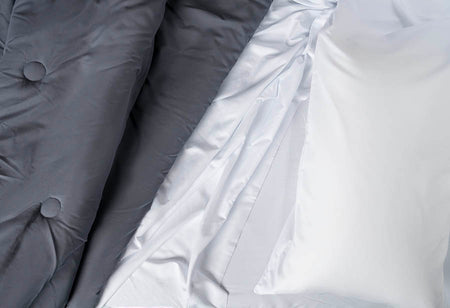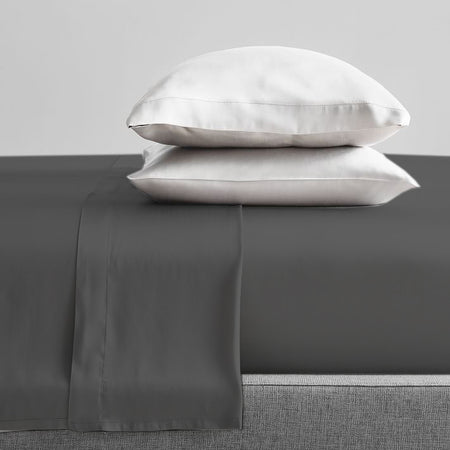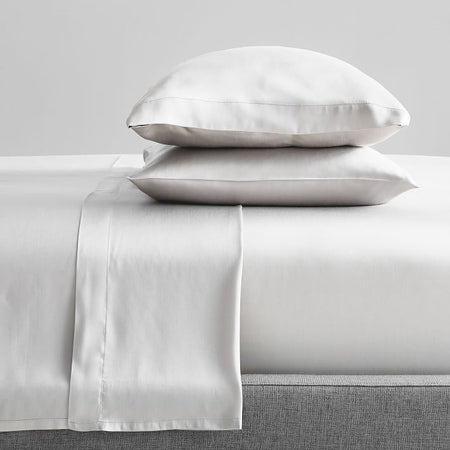If you’ve ever noticed your mood and sleep changing as winter sets in, there’s a reason for it. Seasonal Affective Disorder and sleep are closely linked. When one is off balance, the other usually follows.
So, how do seasonal rhythms influence mental health and vice versa?
Light controls your body clock
Your body runs on an internal timer called the circadian rhythm. It relies on sunlight to know when to wake up and when to wind down. During the winter months, the lack of natural light disrupts that rhythm.
During periods of shorter daylight, your brain starts making melatonin (the hormone that makes you sleepy) earlier in the day, while producing less serotonin (the chemical that keeps you feeling balanced and motivated). That shift explains why you might feel groggy, low, or sluggish when daylight fades early.
Poor Sleep and SAD Feed Off of Each Other

When your sleep quality drops, your body releases more stress hormones and fewer mood-regulating chemicals. That means restless nights can make seasonal depression feel worse. At the same time, SAD itself can cause changes in your sleep patterns.
Some people can’t fall asleep easily (insomnia), while others sleep too much (hypersomnia) but still wake up tired. It’s a frustrating cycle, but it can be broken.
How Quality Sleep Supports Your Mental Health During Winter Months
Restful sleep is one of the simplest ways to support your mental health. While you sleep, your brain clears out stress hormones and restores neurotransmitters like serotonin and dopamine, which are directly linked to mood and motivation.
Deep, consistent sleep also helps regulate your body’s internal clock that controls when you feel awake or tired. When your sleep quality is high, your stress levels naturally go down, your energy stays steady, and you’re better able to handle the emotional ups and downs that come with seasonal affective disorder. Poor or inconsistent sleep has the opposite effect. It disrupts that rhythm, lowers serotonin, and can intensify the sadness or anxiety that often accompany seasonal depression.
Why Your Bed Matters More Than You Think
Your bed shapes the quality of your rest, which directly affects your mood and energy. If your mattress doesn’t give enough support, you’ll toss and turn, wake up stiff, or struggle to fall asleep in the first place.
Over time, that discomfort can lower your sleep quality, which is especially tough during the winter months, when SAD already makes it harder for people to stay energized. Experts often point out that “the right mattress can significantly improve your sleep quality by providing proper support and comfort.” A good mattress keeps your spine aligned, cushions pressure points, and helps your muscles fully relax. If you’re waking up sore or achy, it’s usually a sign your bed isn’t doing its job anymore.
Warmth and softness matter just as much as support. When your bed feels cozy, your body naturally relaxes and produces melatonin. Layering soft sheets, a fluffy comforter, or a breathable wool topper can help maintain the right balance between warmth and airflow — especially if you struggle with winter depression or sleep comfort during colder nights.
Wool and other natural fibers work particularly well because they regulate temperature: they hold heat when it’s cold and release it when you start to warm up. That steady comfort helps your body stay asleep longer and maintains a stable circadian rhythm.
Even small details, like your pillow setup, make a big difference. A supportive pillow that keeps your neck aligned or an extra one between your knees can relieve tension and prevent midnight restlessness.

Some people find that slipping on cozy socks or using a heated mattress pad adds that final layer of calm, especially when the air feels icy. These little comforts may seem small, but they signal safety and relaxation to your nervous system, which can help lower stress hormones and allows you to drift off to sleep more easily.
If your mattress is over seven or eight years old, it may not provide the same support it once did. As mattresses age, their structure changes, creating dips or uneven areas that can disrupt your sleep patterns.
Replacing your older mattress by adding a new, high-quality mattress to your bedroom can make a noticeable difference in the quality of your sleep. When your bed feels comfortable, warm, and supportive, your body can finally let go of tension and that deep, restorative sleep helps protect your mental health through the darker, colder season.
Creating a Sleep Sanctuary That’s Perfect for Winter
Your bedroom should feel like a snug retreat as a whole. So, beyond your bed, here are some winter blues sleep tips for improving sleep in winter:
Start with Bedroom Lighting
As night falls, soften the lights in your home. Turn off harsh overhead lights and switch to lamps with warm, dim bulbs. Even a soft nightlight or a low-wattage bulb by the bed can be soothing.
Bright light late at night tricks your brain into thinking it's still daytime, which suppresses the production of melatonin. In fact, exposure to blue light from phones or TVs before bed can delay sleep and reduce sleep quality. A simple tip: charge devices outside the bedroom or use “night mode” to reduce your exposure to blue light after sundown.
Block Outside Light at Night
Close curtains or blinds at night so that streetlights or an early dawn don’t sneak in. If you wake too early, an eye mask can help keep things dark. Many people also find using a white-noise machine or fan creates a steady sound that masks sudden noise. The goal is to make your room as cool, dark, and quiet as possible.
Let Light in During the Day
Open your curtains first thing in the morning and sit near a window if you can. Natural sunlight helps reset your circadian rhythm for the day. (Even on gray days, outdoor light is much brighter than indoor bulbs.) If going outside is tough, a daylight lamp or a sunrise alarm clock can help.
The goal is balance: plenty of light when you’re up, and darkness when you’re winding down.
Make Your Sleep Space More Inviting
Keep your bedroom tidy and free of work or clutter. A messy room can keep your mind active. Try to reserve your bed for sleep only – no TVs or bright electronics at bedtime. Fresh sheets can make a big difference; many people find the smell and feel of clean linen very relaxing.
Consider adding a cozy rug, an extra pillow, or calming decor. Even a low-volume salt lamp or a small diffuser with lavender oil can help create a cozy ambiance. The more your room feels like a gentle hug, the quieter your mind will become at night.
A steady routine helps reset your system. Try to go to bed and wake up at roughly the same time every day, even on weekends. This small step helps train your internal clock and improve your sleep hygiene. You’ll likely notice you fall asleep faster, stay asleep longer, and wake up feeling more alert. It also helps maintain consistent sleep patterns, which can stabilize your mood over time.

If mornings are a struggle, light can help. Open your curtains as soon as you wake up, or spend a few minutes outside to soak in natural light. If that’s not possible, try light therapy with a daylight lamp to mimic the sun’s brightness.
Exposure to light early in the day helps regulate the production of melatonin and serotonin, which in turn improves both mood and energy levels. Think of it as teaching your brain that it’s daytime again.
Have a Routine and Good Sleep Hygiene
Even the coziest bed won’t do much if your bedtime habits are all over the place. A steady routine helps your brain associate specific cues (such as dim lights, quiet time, or a warm drink) with rest.
Before bed, skip the caffeine and heavy meals, and opt for something soothing instead. Take a warm bath or shower (the cool-down afterward helps you feel sleepy), read a few pages of a book, or do gentle stretches. Little rituals like these train your body to recognize that bedtime is near. Over time, they can help you fall asleep faster and wake up feeling more refreshed.
This consistency is key for keeping your circadian rhythm in balance, especially in winter, when shorter days can confuse your body’s timing. When your sleep is stable, your hormones (like melatonin and cortisol) stay balanced too, which supports both sleep and mental health.
Could Central Sleep Apnea Be Causing My Depression?
If you’ve tried these changes and still feel overwhelmingly sad or tired, don’t hesitate to ask for help. Sometimes an unseen sleep disorder can be at play. For example, central sleep apnea can leave you exhausted and irritable the next day. In fact, any sleep apnea is linked to daytime fatigue and depression-like symptoms.
If you notice loud snoring, gasping for air, or unexplained daytime sleepiness, consider talking to your doctor. At the same time, make sure your mattress and sleep comfort are fully supporting you. A sagging or unsupportive bed can worsen breathing posture and add strain to your body.






















